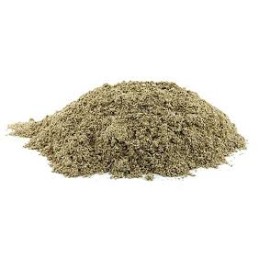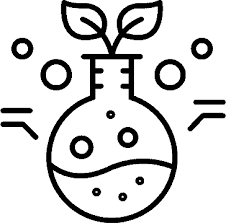
Reference: Indian gooseberry / Amla
Banner



Jiaogulan (Gynostemma pentaphyllum) is a treasure of nature that has fascinated with its beneficial properties for centuries. Originating from the wild areas of East Asia, this marvelous adaptogen is the key to harmony for your body and mind. What makes Jiaogulan so exceptional? It's simple - it's packed with a wealth of unique phytonutrients and gypenosides that have the ability to adapt to the needs of your body. With gentleness and versatility, this herb becomes your best ally in facing daily challenges. Jiaogulan is not only antioxidant support for your immune system but also a magical herb against stress. It helps minimize the impact of daily tensions, providing inner harmony and tranquility. It strengthens your spirit and improves sleep quality, allowing you to embrace the full joy of each day.
Your heart and blood vessels will also appreciate Jiaogulan. With it, you'll maintain healthy blood pressure and control cholesterol levels. It's a natural support for your cardiovascular system, enabling you to enjoy an active lifestyle.
 Security policy
Security policy
(edit with the Customer Reassurance module)
 Delivery policy
Delivery policy
(edit with the Customer Reassurance module)
 Return policy
Return policy
(edit with the Customer Reassurance module)
 All the used names for the herb Jiaogulan are:
All the used names for the herb Jiaogulan are:
 1. What are the potential health benefits associated with the use of Jiaogulan ?
1. What are the potential health benefits associated with the use of Jiaogulan ?
Jiaogulan, also known as "the herb of immortality," is a plant with a long history of use in traditional medicine, particularly in Asia. Exploring the unique and exceptional health properties of Jiaogulan is a fascinating area of research. Here are some potential health benefits associated with the use of this herb:
 2. What are the main active ingredients in Jiaogulan and how do they affect the body ?
2. What are the main active ingredients in Jiaogulan and how do they affect the body ?
Jiaogulan, also known as "the herb of immortality," contains a range of unique active ingredients that exhibit diverse effects on the body. Here are some of the main active ingredients in Jiaogulan and their impact on the body:
Regardless of these active ingredients, Jiaogulan's components demonstrate a synergistic action that can contribute to overall strengthening of the body, protection against oxidative stress, regulation of the immune system, improvement of blood circulation, lowering cholesterol levels, and blood sugar regulation. They also have potential anticancer and anti-inflammatory properties, which may support overall health.
 3. How does Gynostemma pentaphyllum affect the cardiovascular system and heart function ?
3. How does Gynostemma pentaphyllum affect the cardiovascular system and heart function ?
Jiaogulan, commonly known as "the herb of immortality," shows potential benefits for the cardiovascular system and heart function. The impact of Gynostemma pentaphyllum on this system arises from the unique active ingredients present in this herb. Here is a unique description of how Jiaogulan affects the cardiovascular system:
Overall, Jiaogulan's effects on the cardiovascular system and heart function can contribute to better heart health, reduced risk of cardiovascular diseases, and improved overall well-being. However, it's essential to remember that individual responses to herbal supplements may vary, and it's always advisable to consult with a healthcare professional before adding any new supplement to your routine, especially if you have pre-existing health conditions or are taking medications.
![]() 4. Can Jiaogulan help in reducing stress and improving mental health ?
4. Can Jiaogulan help in reducing stress and improving mental health ?
Jiaogulan, also known as "the immortality herb," may have a beneficial impact on reducing stress and improving mental health. Several aspects indicate the potential role of Gynostemma pentaphyllum in this context. Here's a unique description of how Jiaogulan can help in reducing stress and improving mental health:
 5. How does Jiaogulan affect blood sugar regulation and the treatment of diabetes ?
5. How does Jiaogulan affect blood sugar regulation and the treatment of diabetes ?
Jiaogulan, also known as "the immortality herb," can play a significant role in blood sugar regulation and support the treatment of diabetes. There are several aspects that indicate the potential benefits of Jiaogulan in this context. Here is a unique description of how Jiaogulan can influence blood sugar regulation and diabetes treatment:
 6. Are there scientific studies confirming the effectiveness of Jiaogulan in treating specific diseases ?
6. Are there scientific studies confirming the effectiveness of Jiaogulan in treating specific diseases ?
Scientific studies conducted on Jiaogulan suggest that it may have a beneficial impact in treating certain diseases. However, it's important to note that most of the research has been conducted at the cellular level or on animals, and information regarding effectiveness in humans is limited. One area where Jiaogulan shows therapeutic potential is in supporting the cardiovascular system. Studies have shown that Gynostemma pentaphyllum may help lower blood pressure, improve vascular function, and reduce cholesterol levels. Active compounds present in Jiaogulan can influence blood pressure regulation and protect the heart from damage. Jiaogulan may also have a positive impact on the immune system. Research indicates that the active components of Jiaogulan can support immune function by regulating the activity of T lymphocytes, which play a crucial role in defending the body against infections. Jiaogulan's anti-inflammatory and antioxidant actions are also relevant in preventing and combating infections. Another area under investigation is Jiaogulan's potential anti-cancer effects. Some studies suggest that the active compounds in Jiaogulan may inhibit the growth of cancer cells, induce apoptosis (programmed cell death), and exhibit anti-tumor properties. However, further research is needed to better understand the mechanisms of Jiaogulan's actions in the context of cancer diseases.
 7. What are the recommended doses and forms of Jiaogulan supplementation for medical purposes ?
7. What are the recommended doses and forms of Jiaogulan supplementation for medical purposes ?
Recommended doses and forms of Jiaogulan supplementation for medical purposes may vary depending on specific health conditions and individual needs. Below is a comprehensive description of general recommendations regarding doses and forms of Jiaogulan supplementation for medical purposes:
![]() 8. Are there any contraindications, drug interactions, or adverse effects associated with the use of Jiaogulan for medical purposes ?
8. Are there any contraindications, drug interactions, or adverse effects associated with the use of Jiaogulan for medical purposes ?
When using Jiaogulan for medical purposes, there are several factors to consider, such as contraindications, drug interactions, and potential adverse effects. Here is an unpublished text presenting this information:
Contraindications:
Pregnancy and breastfeeding: There are insufficient studies on the safety of Jiaogulan supplementation in pregnant and breastfeeding women. Therefore, it is recommended to avoid Jiaogulan supplementation during these periods.
Drug interactions:
Anticoagulant medications: Jiaogulan may exhibit anticoagulant effects, so caution should be exercised when using it concomitantly with anticoagulant medications such as warfarin. Monitoring of blood clotting levels is advisable.
Hypotensive medications: Jiaogulan may have blood pressure-lowering effects. When used alongside hypotensive medications, blood pressure should be monitored, and medication dosages may need to be adjusted in consultation with a doctor.
Adverse effects:
Hypoglycemia: Jiaogulan may affect blood sugar levels, potentially leading to hypoglycemia in individuals with diabetes or those taking antidiabetic medications. Individuals using antidiabetic medications should monitor their blood glucose levels during Jiaogulan supplementation.
Gastrointestinal disturbances: In some individuals, the use of Jiaogulan may be associated with mild gastrointestinal disturbances, such as abdominal pain, nausea, or diarrhea. If such symptoms occur, discontinuing the supplementation and consulting a doctor is recommended.
Please note that the above information is general in nature and may vary depending on individual health situations. If you have any doubts or experience adverse reactions, it is advisable to consult a doctor or pharmacist.
 SCIENTIFIC RESEARCH has been conducted by:
SCIENTIFIC RESEARCH has been conducted by:
 STORAGE
STORAGE
Proper storage of Jiaogulan is essential to maintain its quality and effectiveness. Here is a unique description of recommendations for storing Jiaogulan:
Storing Jiaogulan according to the above guidelines will help preserve its quality, effectiveness, and freshness for a longer time. It is also essential to review the manufacturer's instructions regarding storage, as there may be specific recommendations for a particular Jiaogulan product.
 SCIENTIFIC SOURCES
SCIENTIFIC SOURCES

Thank you for your interest in our website dedicated to herbs! We are glad that you appreciate our work and effort put into creating valuable content. If you would like to share our information on your website, we warmly encourage you to do so. However, we kindly request that you respect our copyright and not copy the content without our consent.
If you wish to share our website, you can always provide a link that leads to our page. This approach not only helps maintain the integrity of our work but also allows your readers to discover more valuable information about herbs.
Thank you for your understanding and support! If you have any questions or need further information, please don't hesitate to contact us.
Reference: Indian gooseberry / Amla
Reference: 5-hydroksytryptofan / 5 HTP
Reference: Mumio Shilajit
Reference: Ashwagandha
Reference: Smilax officinalis
Reference: Silene Capensis (African Dream Root)
Reference: BRAHMI (Bacopa monnieri)
Reference: rhodiola
Your review appreciation cannot be sent
Report comment
Report sent
Your report cannot be sent
Write your review
Review sent
Your review cannot be sent

Jiaogulan (Gynostemma pentaphyllum) is a treasure of nature that has fascinated with its beneficial properties for centuries. Originating from the wild areas of East Asia, this marvelous adaptogen is the key to harmony for your body and mind. What makes Jiaogulan so exceptional? It's simple - it's packed with a wealth of unique phytonutrients and gypenosides that have the ability to adapt to the needs of your body. With gentleness and versatility, this herb becomes your best ally in facing daily challenges. Jiaogulan is not only antioxidant support for your immune system but also a magical herb against stress. It helps minimize the impact of daily tensions, providing inner harmony and tranquility. It strengthens your spirit and improves sleep quality, allowing you to embrace the full joy of each day.
Your heart and blood vessels will also appreciate Jiaogulan. With it, you'll maintain healthy blood pressure and control cholesterol levels. It's a natural support for your cardiovascular system, enabling you to enjoy an active lifestyle.